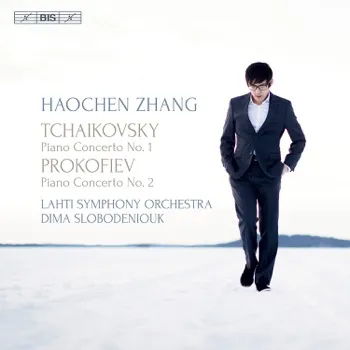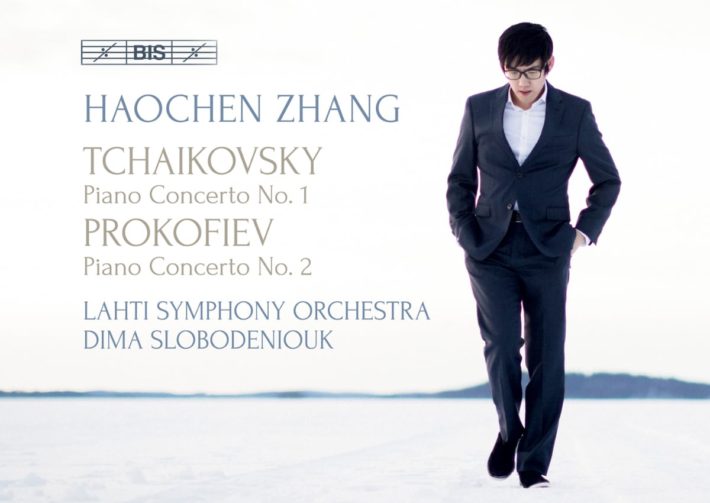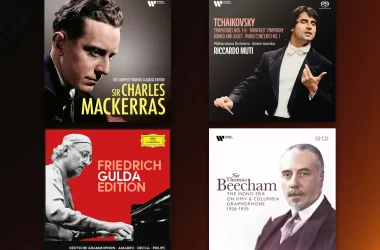In a new, pristine recording from BIS, pianist Haochen Zhang takes a big step in his career, presenting on record Tchaikovsky’s First Piano Concerto and Prokofiev’s Second. For Zhang, it is his first studio recording of a concerto; previously, after winning the top spot at the prestigious Van Cliburn competition in 2009, he had only recorded a set of intimate solo works, also for BIS. The album showcases many strengths of both soloist and orchestra, but also shows that they still have room to grow.

Zhang possesses a virtuosic technique (his winning repertoire in the 2009 Van Cliburn competition included Petrushka and Gaspard de la Nuit), and here both concertos give him ample opportunity to showcase it. In two striking segments of the Prokofiev, Zhang uses his mastery to profess an interpretation of the concerto that few can credibly attempt: cold, futurist minimalism. This is not Steve Reich’s minimalism; It is a minimization of romantic gestures and of warm colors. The first of those two segments is the “Moto-Perpetuo” scherzo. Zhang’s playing is simply unforgiving. A second such segment comes at the opening of the concerto’s finale; Zhang here is, simply put, vicious, and the results are chilling.
There are, however, moments where this version of the Prokofiev is less effective. In the opening, marked “Narrante”, the phrases and rubatti are jolted and overly calculated. It feels like a glossy, new paint job of an old story, rather than a completely novel “narration”. That movement’s cadenza is tense and indeed “colossal” where Prokofiev indicates it, but it could have been even more prodigious, with proper space for the music to breathe within and between phrases. Jean-Efflam Bavouzet and Yundi Li both give more convincing (if traditionally late-Romantic) accounts of the opening and the cadenza.
In the Tchaikovsky, Zhang again gives a technically thrilling, if occasionally emotionally removed performance. Comparisons with other stand-out, recent recordings of the piece are instructive. For instance, at the main, dotted-rhythm theme of the first movement, Zhang’s playing is polished and incisive but lacks color compared with, say, Beatrice Rana. When Rana plays this theme, there are three distinct colors: the dance-like phrase, the warmer major-third “commentaries” (as Barenboim might call them), and the upper-register flourishes. The colors are created by changing front and back-end articulations, and with very subtle modulations of the pulse. Zhang’s playing is cooler, with the slightest shifting of a pulse. Throughout the first movement, this leaves the performance more emotionally detached than one might expect for Tchaikovsky.
A similar comparison could be made in the Andantino, this time to Denis Kozhukin’s recent version of the concerto. Kozhukin uses a whole array of sounds in this movement, starting off straight and present, transitioning to a lighter, fluid touch when he accompanies the celli, oboe, and clarinet. Zhang remains monochromatic throughout the opening, wielding a particularly pointy staccato. Tchaikovsky does indeed indicate “Sempre Staccato” when the soloist accompanies the orchestra, but Kozhukin’s staccato is perfectly convincing while managing to be warm as well.
It is in the Tchaikovsky’s up-tempo sections, the prestissimo section of the Andantino and the concerto’s finale, that Zhang’s abilities shine. He plays with momentum, at once graceful and forceful, and his reading of the rondo is quite astounding. The recurring theme is spritely and engaging, if one can put aside the disorienting rhythmic stereotypy. The second theme flows wonderfully, and the final moments are exciting, leaving one generally in awe.
Clarity as a Default
Throughout both pieces, the Lahti Symphony Orchestra provides impressive support for Zhang, though not without blemishes. Intonation and coordination issues are out of the question. In the Prokofiev, the orchestra matches Zhang’s intensity and rhythm. Two clear examples are the woodwind flurries in the scherzo, and the percussion punctuations throughout, both groups benefitting from good audio work and a clean-cut mastering style (this is true both for the stereo and the SACD, this album being a Hybrid). Indeed, clarity seems to be the default mode of the orchestra. In the Tchaikovsky, this fact seems to work against them; the strings use very little vibrato, and the winds and brass are reserved in their more chordal accompaniments. Additionally, many of the woodwind solos fail to craft a melodic line that sufficiently supports the piano lines. The orchestra doesn’t quite achieve the Romantic atmosphere that has come to be associated so strongly with this piece, or with Tchaikovsky for that matter.
The players do have other styles in reserve, besides clear intensity. These include a casual, care-free elegance, to be found in the Cantabile passages of the second movement’s Prestissimo section in the Tchaikovsky, or a lush Mysterioso, to be found in the opening of the Prokofiev Concerto. Their orchestral voice is clearly well-trained; in the future, one hopes that they begin to push their boundaries.
On the whole, this album is a wonderful preview of what Zhang and the Lahti Symphony may have to offer in the future. Zhang brings a flair to the album that few others who have recorded these pieces can. For piano enthusiasts, it is worth listening for the Prokofiev alone, and the Tchaikovsky is not a bad bonus.
Tchaikovsky – Piano Concerto No. 1, Prokofiev – Piano Concerto No. 2
Haochen Zhang – Piano
Lahti Symphony Orchestra
Dima Slobodeniouk – Conductor
BIS Records, Hybrid SACD BIS-2381




















